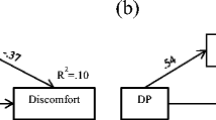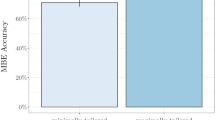Abstract
Evidence is provided on faculty use of cheating deterrents for in-class exams. The evidence comes from a survey of students who report on their most recent in-class exam in a randomly selected course that they are taking. Three types of cheating are considered: (i) advance knowledge of exam questions; (ii) copying; and (iii) other improper student actions during the exam. The deterrents examined consist of the following: (i) a rate of repeating questions; (ii) multiple versions of the exam and seating arrangements; and (iii) monitoring. The sample size is small but may cover about one-fourth of the faculty at the institution at which the survey was conducted.
Similar content being viewed by others
References
Barnett, D., & Dalton, J. (1981). Why college students cheat. Journal of College Student Personnel, 22(6), 545–551.
Bernardi, R., Baca, A., Landers, K., & Witek, M. (2008). Methods of cheating and deterrents to classroom cheating: an international study. Ethics & Behavior, 18(4), 373–391.
Brown, B., Weible, R., & Olmosk, K. (2010). Business school deans on student academic dishonesty: a survey. College Student Journal, 44(2), 299–308.
Coren, A. (2011). Turning a blind eye: faculty who ignore student cheating. Journal of Academic Ethics, 9, 291–305.
Diekhoff, G., LaBeff, E., Clark, R., Williams, L., Francis, B., & Haines, V. (1996). College cheating: ten years later. Research in Higher Education, 37(4), 487–502.
Eisenberger, R., & Shank, D. (1985). Personal work ethic and effort training affect cheating. Journal of Personality and Social Psychology, 49(2), 520–528.
Graham, M., Monday, J., O’Brien, K., & Steffen, S. (1994). Cheating at small colleges: an examination of student and faculty attitudes and behaviors. Journal of College Student Development, 35, 255–260.
Greenberg, J. (1979). Protestant ethic endorsement and the fairness of equity inputs. Journal of Research in Personality, 13, 81–90.
Houston, J. (1976). Amount and loci of classroom answer copying, spaced seating, and alternate test forms. Journal of Educational Psychology, 68(6), 729–735.
Houston, J. (1983). Alternate test forms as a means of reducing multiple-choice answer copying in the classroom. Journal of Educational Psychology, 75(4), 572–575.
Houston, J. (1986). Classroom answer copying: roles of acquaintanceship and free versus assigned seating. Journal of Educational Psychology, 78(3), 230–232.
Keith-Spiegel, P., Tabachnick, B., Whitley, B., & Washburn, J. (1998). Why professors ignore cheating: opinions of a national sample of psychology instructors. Ethics & Behavior, 8(3), 215–227.
Kerkvliet, J., & Sigmund, C. (1999). Can we control cheating in the classroom. The Journal of Economic Education, 30, 331–343.
Lovett-Hooper, G., Komarraju, M., Weston, R., & Dollinger, S. (2007). Is plagiarism a forerunner of other deviance? Imagined futures of academically dishonest students. Ethics & Behavior, 17(3), 323–336.
Newstead, S., Franklyn-Stokes, A., & Armstead, P. (1996). Individual differences in student cheating. Journal of Educational Psychology, 88(2), 229–241.
Premeaux, S. (2005). Undergraduate student perceptions regarding cheating: tier 1 versus tier 2 AACSB accredited business schools. Journal of Business Ethics, 62, 407–418.
Staats, S., Hupp, J., Wallace, H., & Gresley, J. (2009). Heroes don’t cheat: an examination of academic dishonesty and students’ views on why professors don’t report cheating. Ethics & Behavior, 19(3), 171–183.
Tabachnick, B., Keith-Spiegel, P., & Pope, K. (1991). Ethics of teaching: beliefs and behaviors of psychologists as educators. American Psychologist, 46(5), 506–515.
Volpe, R., Davidson, L., & Bell, M. (2008). Faculty attitudes and behaviors concerning student cheating. College Student Journal, 42(1), 164–175.
Wright, J., & Kelly, R. (1974). Cheating: student/faculty views and responsibilities. Improving College and University Teaching, 22(1), 31–34.
Acknowledgement
I thank an anonymous reviewer and participants at the PEA Conference for helpful comments. The views in this manuscript are mine and are not necessarily the views of any organization with which I am affiliated.
Author information
Authors and Affiliations
Corresponding author
Rights and permissions
About this article
Cite this article
Liebler, R. Student Perceptions of Faculty Use of Cheating Deterrents. J Acad Ethics 10, 327–333 (2012). https://doi.org/10.1007/s10805-012-9170-7
Published:
Issue Date:
DOI: https://doi.org/10.1007/s10805-012-9170-7




